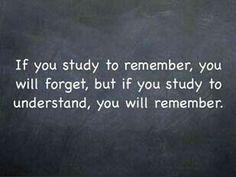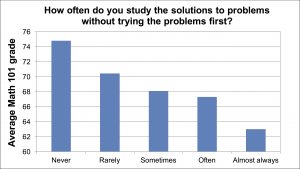Using time efficiently
“I found that I became so easily distracted when I was having difficulty with a concept. I would give up early on and just get on social media and browse the internet. I had to change this by getting help as soon as I could, and removing all distractions from the room.”
Sofia – former Math 101 student
As you continue your journey through first year university, you should regularly evaluate your study habits and ask yourself “Is this working for me?”. For example:
- Do you get easily distracted by social media, games, or other entertainment while studying? Consider printing out the math problems you want to work on and working with only a textbook, paper, and pencil/pen/eraser. For WeBWork, you can print out a PDF of the assignment. If you must be on the computer but cannot avoid the temptation of certain websites, consider a website blocking software such as Cold Turkey, as explained in this video.
- Do you tend to stay stuck on a single problem for a really long time? Consider writing down your questions and bringing the questions to the professor, the MLC, or posting them on the Piazza forum for your course.
- Do you spend a lot of time trying to get started when solving a problem? See the section on problem solving on this site.
- Do you tend to daydream and have trouble staying focused? Consider the pomodoro technique, where you concentrate for 25 minutes at a time with 5 minute breaks in between. Also consider making your studying more active (see active versus passive learning below).
- Do you find that you do lots of problems but still can’t solve problems on the test? See the section on using problems efficiently below and the page on test preparation.
Active versus passive studying
“I noticed that I was spending too much time reading the textbook and not enough time doing practice problems.”
Karina – Former Math 180 student
Passive studying strategies such as re-reading, word for word copying, and watching videos are often appealing because they allow you to cover a lot of content in a short amount of time. However, in university you will encounter increasingly complicated examples and deep concepts, and it is difficult to tackle these larger concepts and examples with passive studying strategies. Instead, here are some suggestions for being more “active” during your studying:
- Treat the examples in the textbook as problems. Cover up the solution to the example and work through it on a separate sheet of paper, revealing more of the example only once you are stuck.

- Take notes while you read. Summarize what you have already understood in your own words, and write down questions when you are still confused.
- Consider explaining concepts to yourself using the Feynman technique.
Based on student survey data from 2016, students who spend a lot of time reading the solutions to problems without trying to do the problems generally do worse in the course (graph below is for Math 101).

Click on the graph for more detailed data and statistics. Data obtained using student surveys in Math 101 in 2015W at UBC. Research funded by the CWSEI and the Department of Mathematics.
Using practice problems efficiently
“I realized that I was spending too much time mindlessly doing the questions and not really reflecting on how I was doing. I shifted my focus from just doing the questions to ‘how’ I’m doing the questions and how I’m approaching studying, and this is proving to be very successful.”
Yuni – former Math 101 student
A common mistake among students is to solve many problems in succession with little time between solving one problem and starting the next. While this may allow you to complete many problems, it will not maximize the experience you can gain from those problems.
In order to make the most your time solving problems, you’ll want to spend some time after each problem reflecting on the problem. This will help you to develop the flexibility you need to deal with the variety of problem types you’ll encounter later. Here are some examples of questions to ask yourself after solving a problem:
- What one piece of advice could I have given myself before starting the problem?
- What mistakes did I make during the problem, and how could I have avoided these mistakes?
- What techniques and concepts did I use when solving the problem, and why did I use those techniques and concepts?
